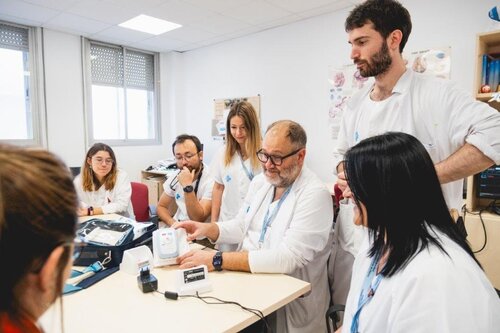New emergency treatment could improve recovery of stroke patients in Catalonia
A clinical trial led from Lleida has shown that the pre-hospital application of a technique called remote ischaemic conditioning can be a safe and promising strategy to improve recovery
A clinical trial led from Lleida, from the Arnau de Vilanova University Hospital of Lleida (HUAV), together with the Emergency Medical System (SEM), the Vall de Hebron University Hospital, the Sant Joan Despí Moisés Broggi Hospital and the Bellvitge University Hospital, has shown that the early application of a technique called remote ischaemic conditioning (RIperC) can be a safe and promising strategy to improve the recovery of people who suffer an ischaemic stroke. The project, known as REMOTE-CAT, involved 122 patients and the results have been published in the scientific journal eClinicalMedicine.
This study opens the door to new approaches to brain protection that can be applied before the patient arrives at the hospital, with the potential to substantially improve outcomes in one of the world's leading causes of disability and mortality. The innovative method involves automatically inflating and deflating a cuff on the patient's forearm inside the ambulance as he or she is being transported to hospital, with the aim of stimulating the brain's natural protective mechanisms. This "remote" stimulation activates natural defence mechanisms that could protect the brain from damage caused by the stroke, buying valuable time until definitive treatment can be given in hospital.
The results show that at 90 days post-stroke, a higher proportion of patients treated with RIperC had a good recovery (64.9%) compared to the placebo group (47.3%). Although the difference was not statistically significant in the main analysis, an adjusted analysis revealed a clinically relevant and statistically significant benefit.
'Despite the relatively small number of participants, our results indicate that applying RIperC in the pre-hospital phase is safe and could improve patient outcomes,' says Francisco Purroy, head of Neurology at the HUAV, professor at the University of Lleida and head of the Clinical Neurosciences research group at the Institute for Research in Biomedicine of Lleida (IRBLleida).
'New studies on a larger scale are needed to definitively confirm these benefits,' the researcher added. He also highlights the fundamental role of the EMS professionals, who applied the intervention during the ambulance transfer, and the emergency nursing team.
Stroke occurs when a part of the brain suddenly stops receiving blood, either by blockage of an artery (ischaemic stroke) or by haemorrhage. It is one of the world's leading causes of disability and mortality. In the case of stroke, time is of the essence: the sooner action is taken, the better the chances of recovery.
The study was conducted between 2019 and 2023 and involved 200 patients initially seen by EMS with suspected acute-phase stroke. A total of 122 were subsequently confirmed as having a stroke or transient ischaemic attack and were included in the final analysis. This project has been made possible thanks to the involvement and coordination between the teams at the Reus coordination centre and the basic life support teams in the area. To carry it out, in addition to the organisational aspects, it has required a continuous training effort by the emergency technicians to apply the clinical trial procedure.
'This trial is an example of innovation and collaboration between Catalan health centres, with the leadership of the neurology team at the Arnau de Vilanova Hospital in Lleida and the Clinical Neurosciences Group at IRBLleida, along with the active involvement of many professionals throughout the region,' added Purroy.
It is worth highlighting the coordination task between the different rooms of the Central Health Coordination Centre (CECOS) of the EMS, the territorial teams involved (health regions of Tarragona, Lleida and Metro Sur) and the Research Unit of the EMS.
The research was made possible thanks to a grant from the Carlos III Health Institute, the Agency for the Management of University and Research Grants (AGAUR) and the European Union (ERDF A way to make Europe).
Article: Purroy F, Arque G, Mauri G, García-Vázquez C, Vicente-Pascual M, Pereira C, Vazquez-Justes D, Torres-Querol C, Vena A, Abilleira S, Cardona P, Forné C, Jiménez-Fàbrega X, Pagola J, Portero-Otin M, Rodríguez-Campello A, Rovira À, Martí-Fàbregas J. REMOTE Ischemic Perconditioning Among Acute Ischemic Stroke Patients in Catalonia: REMOTE-CAT PROJECT. Front Neurol. 2020 Sep 25;11:569696. doi: 10.3389/fneur.2020.569696. PMID: 33101178; PMCID: PMC7546310.

Clinical Neurosciences research group. Photo: HUAV.






